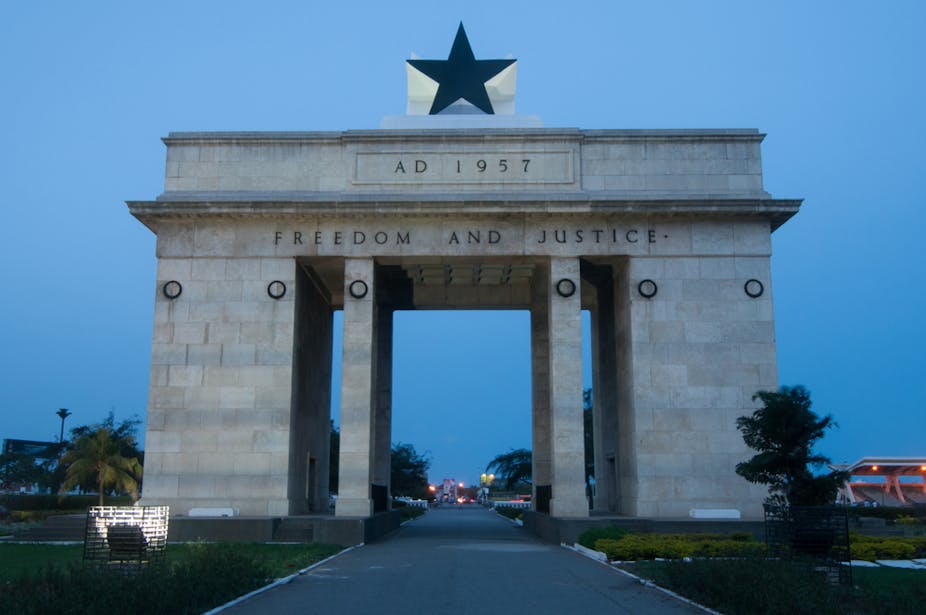In 1872 Mark Twain wrote that juries were “the most ingenious and infallible agency for defeating justice that human wisdom could contrive”. More than 140 years later his statement unfortunately holds true for Ghana.
Ghana is one of only a handful of African countries that still use juries. Prior to British colonialisation criminal offenders were usually judged and punished by local chiefs and their advisers. The jury system was introduced under British colonial rule and is still used for the prosecution of the most serious criminal offences.
Ghanaian juries are composed of seven individuals randomly selected from a list composed mainly, if not exclusively, of civil servants. Their responsibility is to decide, based on evidence presented in court, whether a defendant is guilty of the offence for which they have been charged. They are not involved in sentencing.
A key argument in support of the jury system is that it is a valued form of citizen participation in democracies. Supporters argue that juries minimise state oppression by having an unbiased group of one’s peers, instead of a judge, decide the fate of an accused person.
Unfortunately, the jury system in Ghana faces serious challenges. Inefficiency, infringement of human rights and wasteful use of resources results in a bad deal for everyone – the accused, the victim, the courts and society.
Why the system is flawed
There are a number of reasons why the jury system doesn’t work well in Ghana.
The main one is the alarming frequency with which criminal cases are adjourned due to the absence of one or more jury members. This significantly delays the trial process, often while the accused is on remand.
Ghana has provision for a fine or imprisonment to be applied to jury members who fail to attend court without a “reasonable excuse”. But this is rarely, if ever, applied.
Where non-attendance is persistent, as it often is, an absent juror can either be replaced or the entire jury discharged. In either case the law requires the trial to commence afresh, no matter how far along it has progressed. This obviously causes significant inconvenience for all involved. It also has implications for the right to a fair trial and the right to trial within a reasonable time as guaranteed by Ghana’s constitution.
One option would be for trials to continue with the judge acting alone. Alternatively, trials could continue with the remaining jurors. In England and Wales for example, although 12 individuals are initially assigned to a jury, the law permits the trial to continue with as few as nine members.
Also of concern is the anecdotal evidence that jurors sit in several cases during the same period of service or are selected for jury duty several times in a short time frame. These individuals are known as “professional jurors”. It is not unreasonable to assume that their effectiveness could be compromised because of “juror fatigue”.
There are also problems with restrictions on who can serve on a jury.
In Ghana, the Criminal Procedure Code prevents a significant number of individuals from serving on a jury, mainly professionals and high-ranking civil servants. This effectively reduces the pool of potential jurors who are capable of understanding the gravity and nature of criminal court proceedings. This is worrying for a country with a 40% literacy rate in rural areas. The literacy rate in urban areas is higher at 70% but still poses a problem.
The current law also bars those below the age of 25 and those above the age of 60 from being jurors. This too unnecessarily excludes a useful segment of society from the jury pool.
In addition, jury selection is complicated by the fact that outside Ghana’s large cities – Accra, Kumasi and Sekondi-Takoradi – the country is made up of many small villages and towns. The comparatively small local populations, in conjunction with the small pool of eligible jurors, means that those selected often reside or work in the same vicinity as the defendant. This heightens the chance that a juror will either know, or know someone who knows, the defendant. This may undermine impartiality.
What needs to be done
It is crucial that these problems are adequately addressed. This should include legislative and administrative reforms.
Some solutions, for example, could include:
allowing jury trials to be converted to bench trials in restricted circumstances,
widening the category of eligible jurors,
imposing sanctions for unwarranted jury absenteeism, and
repealing the requirement for a re-trial due to discharge of a juror.
These steps would considerably assist in modernising the Ghanaian jury system in criminal cases. It would also, importantly, minimise the negative impact that jury trials are having on the rights of the accused.
The changes would bring the jury system in line with international standards of good governance and contribute to increasing the legitimacy of the criminal justice system and the public’s respect for it.
Some have advocated for the abolition of jury trials in Ghana. This may be worth exploring. But if it is to be retained it must operate in a way that seeks to achieve the optimal level of justice.
Ghana needs faster, safer and less expensive criminal verdicts. This must be done urgently, as every day the status quo is maintained is another day that justice and constitutional rights are whittled away.

